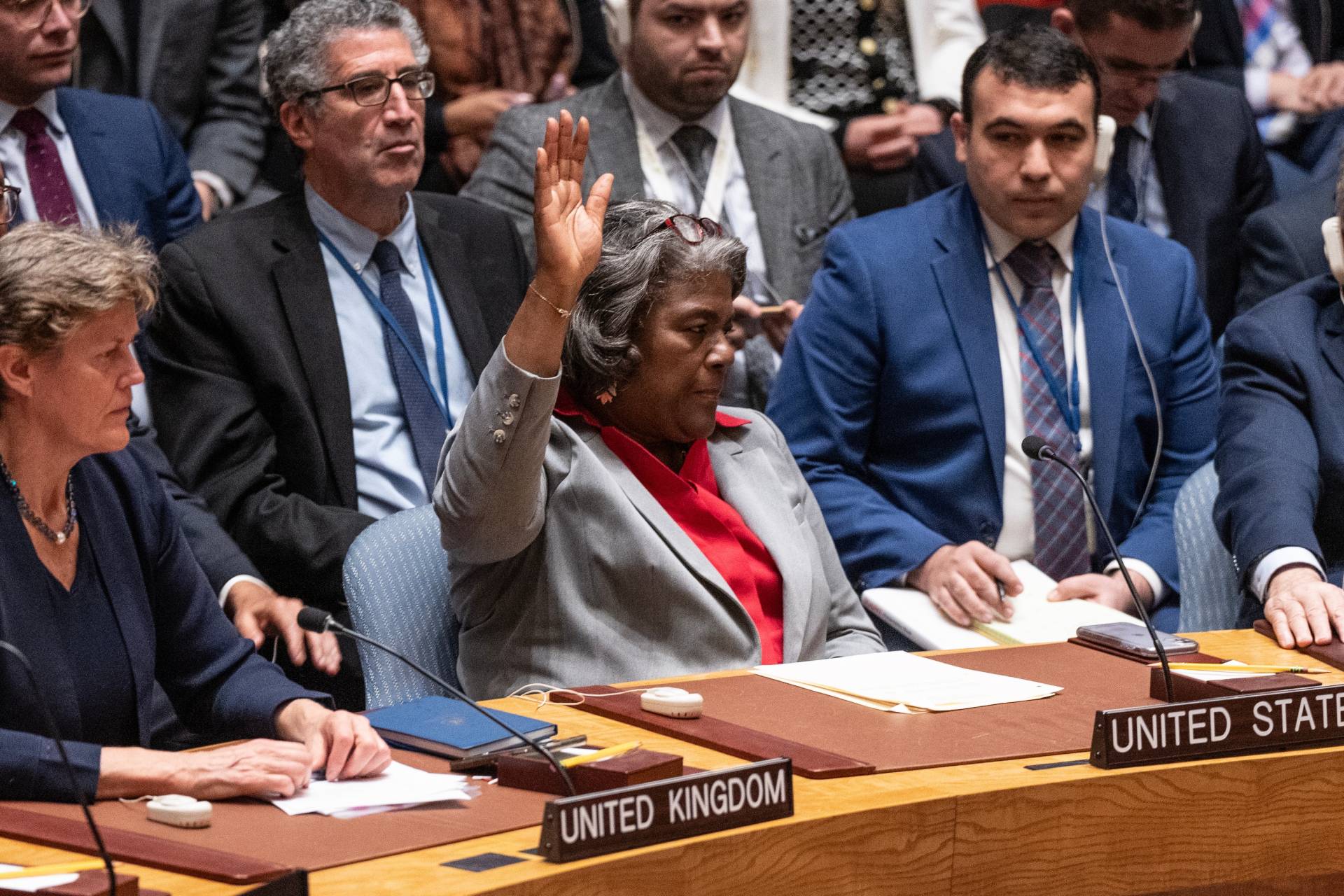Ever since US President Harry Truman made the decision to recognize the State of Israel in 1948, the two countries have had what both have called a “special relationship.” It’s important to note that the US deems other relationships “special” such as with the UK, Japan and even Saudi Arabia. In the case of the Gulf Kingdom, the reasons are very different from the others.
Over the decades — encompassing Israel’s several wars with neighboring states, two Palestinian intifadas, incursions into Lebanon during its civil war, a major war with Hezbollah, and the existential threat posed by Iran — the US–Israel relationship has become only closer. In the past, it included substantial flows of both economic and now substantial military aid, exports of America’s most sophisticated weaponry, sharing of sensitive intelligence, unflinching support of the US Congress, and the nearly predictable US veto of any United Nations Security Council (UNSC) resolution undermining Israeli security or political standing.
The US broke with tradition on March 25 when it abstained from a UNSC vote calling for a ceasefire in Gaza and the release of all hostages held by Hamas — but importantly not linking the two as the US preferred. Nevertheless, under increasing pressure from the Democratic Party’s political base for its heretofore staunch support of Israel in the war, the Biden administration finally felt it necessary to respond with the abstention.
There are two issues to bear in mind with this important but not unprecedented vote of the US. First, the action of the US administration was the least impactful of those it could have taken if it truly wished to change Israel’s current course of action in the war. UNSC resolutions, though mandatory under the UN Charter, are unenforceable. Israel, Turkey and other countries have frequently ignored previous UNSC decisions without any consequences. So, the US abstention and the resolution itself are mostly symbolic.
Second, this was not the first time the US has abstained on a UNSC vote seen as critical of Israel. On no fewer than 55 occasions, the US has abstained on such votes, more under Republican administrations than Democrat, including Richard Nixon (15) and Ronald Reagan (21). Donald Trump had the fewest abstentions (none), followed by Barack Obama (1).
On the relationship, full steam ahead
The second point is the more relevant one. None of the US abstentions fundamentally changed the nature of the US–Israel special relationship. Most of them have been done to register American pique with a particular Israeli policy or political action at the time. Before departing office in early 2009, Obama’s UN representative abstained on a UNSC vote critical of Israel’s settlement expansion in the West Bank to make a point.
The abstention had no appreciable impact on the relationship, however. In fact, also prior to leaving office, the Obama administration negotiated the most generous long-term military assistance package for Israel in history, amounting to over $3.8 billion per year for ten years. Israel’s unchanged settlement policy remains a neuralgic issue in the relationship. Trump offered nearly a blank check to Israel in his administration, pronouncing settlements no longer illegal, recognizing Golan as part of Israel, moving the US embassy from Tel Aviv to Jerusalem, and closing the US consulate in Jerusalem intended to serve the Palestinians.
US President Joe Biden has been extremely supportive of Israel and even called himself a “Zionist.” So, Israel need not be overly concerned necessarily with the US abstention, though it needs to pay attention to the message behind it. Nor should Israel’s enemies, whether Hamas, Hezbollah or Iran, necessarily rejoice over a seemingly microscopic victory at the UN. America has no intention of abandoning its friend. Not now … and not ever.
EMBED: https://youtu.be/Jov9jxRecFc?si=Mx1-uBBoGfuf1so-
Biden, Bibi and the big stakes on the global stage
The rift between Biden and Israeli Prime Minister Benjamin Netanyahu, aka Bibi, is widely known. Recent conversations between the two have ended up in obstinacy and rigidity on Bibi’s part, abject frustration on Biden’s, and bitter acrimony on the part of both. So, America’s anger with Israel is partially attributable to the rapidly dissolving relationship between the two leaders.
Netanyahu’s single-minded pursuit of the destruction of Hamas by leveling Gaza, with the border town of Rafah next up in the battle plan, was the administration’s last straw. It had to act, if only symbolically, with a minimalist non-veto in the UN Security Council. More significantly, the abstention represents the end of the Biden administration’s patience with and tolerance for Bibi. Expect the animosity between the two to worsen.
So, as on previous occasions, US pique, if not fury, is one clear reason for sheathing its veto sword.
But it is much more than US pique that is driving Biden’s actions. There is the aforementioned growing dissension within Biden’s own party, with which Bibi will have no sympathy. More important, however, for both countries, is the growing isolation of Israel, but also America, in the international community. The Global South (with few exceptions, India perhaps the biggest) has condemned Israel’s military campaign in Gaza as akin to a war crime if not genocide. America, also a vociferous backer of Ukraine in its war against Russia’s occupation of Crimea and eastern areas, is criticized for holding a double standard in the Palestinians’ battle against Israeli occupation in the West Bank and its current military campaign in Gaza.
Even more biting, some of America’s closest allies and Israel’s staunchest supporters in the West have also criticized Israel publicly and the US more quietly for the two countries’ policies and actions.
For the US, these aren’t customary foreign government barbs that it can easily dismiss. This administration set out early on not only to shore up its traditional alliances, e.g., NATO, Japan and South Korea, but also to broker newer ones with nations of the Global South, e.g., India, the United Arab Emirates and Brazil. America’s support for Israel in Gaza threatens to undo much of that. Israel has become a strategic liability for Biden’s grand plans to preserve and advance liberalism and global prosperity in the face of the challenge of illiberalism and authoritarianism.
The irony is that the Biden administration actually gets it when it comes to Israel’s security. They understand that Israel can never be secure as long as an incorrigibly hostile Hamas exists on its southern border. They have also made clear their support for the two-state solution, a ceasefire in Gaza and immediate release of all remaining Israeli hostages. It’s Israel’s tactics, not its longer-term objective, to which the US — and most of the rest of the world — objects. But Israel’s tactics and resistance to even entertaining discussion of an eventual two states rile Biden and the rest of the world.
The bigger threat
Perhaps the biggest concern of the US administration is the grand battle to come — Israel versus Hezbollah and Iran. Biden’s concern is that if Israel loses the support of the international community over Gaza, it will face enormous problems if war erupts between Israeli troops in North Israel and Hezbollah in South Lebanon. The Jewish state will need all the help it can get, and not just from the US.
Moreover, having effectively stood down in intervening on behalf of Hamas in the war in Gaza, Iran would feel strategically obliged to stand up for its most important ally, Hezbollah. If not, Iran’s “axis of resistance” falls apart. War between Israel and Hezbollah/Iran would be a full-on Middle East war. And though all the parties profess their preference for avoiding such a conflict, the tensions are stratospheric at the moment, and confrontations between Israeli and Hezbollah forces on and across Israel’s northern border continue to escalate. One miscalculation by either side could easily explode into another major war, dwarfing what’s occurred in Gaza.
The mood of the international community at the moment is decidedly — and unfairly, in the view of many in the US — against Israel. Those critical attitudes have not translated into support for Hamas, but they have placed Israel on the defensive in having to justify its war against an avowed terrorist organization bent on its destruction. The reasons for these critical and even hostile views toward Israel are many, the most prominent being its continuing occupation of the West Bank and (before the war) blockade of Gaza.
The US administration wants to overcome this with its proposal that Israel acknowledge the necessity of a two-state solution, thereby diffusing much of the animus now directed toward Israel. Failing this acknowledgment, were a war to break out against Hezbollah, these same critics and even some of Israel’s friends might decide to sit on the sidelines. Neither Israel nor America can afford that scenario. In a war with Hezbollah and potentially Iran, Israel will need the world’s support. A world hostile to Israel in such a case would be a gift to Hezbollah, Iran and every illiberal, authoritarian state.
America’s extraordinary UNSC abstention undoubtedly has caused heartburn in Jerusalem. But the message for Israel is simple: The Israeli government must change its approach in Gaza and more generally toward the Palestinians to keep its friends in the event of a much bigger challenge in the future. Washington hopes that, over time, this message is received and embraced.
The views expressed in this article are the author’s own and do not necessarily reflect Fair Observer’s editorial policy.
Support Fair Observer
We rely on your support for our independence, diversity and quality.
For more than 10 years, Fair Observer has been free, fair and independent. No billionaire owns us, no advertisers control us. We are a reader-supported nonprofit. Unlike many other publications, we keep our content free for readers regardless of where they live or whether they can afford to pay. We have no paywalls and no ads.
In the post-truth era of fake news, echo chambers and filter bubbles, we publish a plurality of perspectives from around the world. Anyone can publish with us, but everyone goes through a rigorous editorial process. So, you get fact-checked, well-reasoned content instead of noise.
We publish 2,500+ voices from 90+ countries. We also conduct education and training programs
on subjects ranging from digital media and journalism to writing and critical thinking. This
doesn’t come cheap. Servers, editors, trainers and web developers cost
money.
Please consider supporting us on a regular basis as a recurring donor or a
sustaining member.
Will you support FO’s journalism?
We rely on your support for our independence, diversity and quality.










Comment